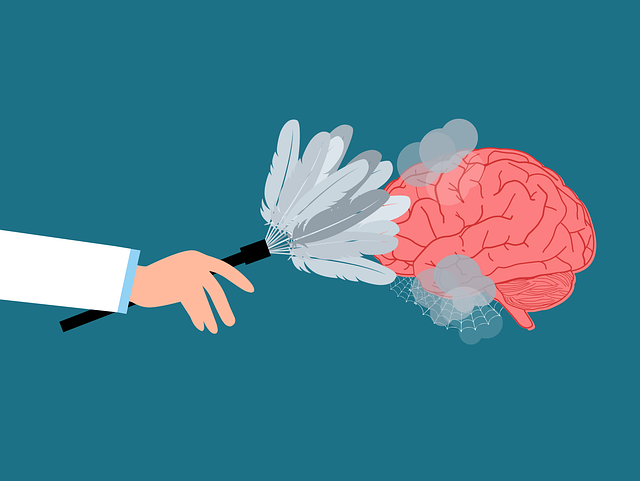Understanding Mental Health Data through diverse sources like clinical assessments, self-reported questionnaires, therapy observations, and journaling exercises is vital for effective Denver ADD-ADHD evaluations and tailored therapy. These evaluations provide detailed insights into cognitive functions and behavioral patterns, enabling therapists to create personalized treatment plans focusing on attention span, impulse control, and executive functioning. Advanced statistical techniques and cultural competency training enhance the accuracy and effectiveness of these programs, leading to improved patient outcomes and a stronger network of support in Denver and beyond.
Mental health data analysis has emerged as a powerful tool for enhancing therapeutic outcomes. In this article, we explore essential aspects of mental health data interpretation, focusing on Denver ADD-ADHD evaluations as a key component of therapy. We delve into understanding the foundational principles behind data collection, analyzing patterns, and translating insights into actionable strategies. By leveraging data-driven approaches, therapists in Denver can optimize treatment plans for individuals with ADD/ADHD, fostering better outcomes and improved quality of life.
- Understanding Mental Health Data: A Foundation for Interpretation
- The Role of Denver ADD-ADHD Evaluations in Therapy
- Analysis Techniques for Uncovering Patterns and Insights
- Interpreting Results: From Data to Actionable Strategies
- Enhancing Treatment Effectiveness through Data-Driven Approaches
Understanding Mental Health Data: A Foundation for Interpretation

Understanding Mental Health Data is a pivotal step before any interpretation, serving as the bedrock for informed decision-making in Denver ADD-ADHD evaluations and therapy. This process involves meticulous collection and analysis of various data points related to an individual’s mental wellness. It encompasses not just clinical assessments but also qualitative insights gleaned from self-reported questionnaires, observations during therapy sessions, and even daily Mental Wellness Journaling Exercises. By integrating these diverse sources, professionals gain a holistic view of each patient’s unique challenges and strengths.
This foundational understanding allows for the tailoring of interventions like Social Skills Training to address specific needs. For instance, analysis might reveal patterns in behavioral responses that point to underlying issues, prompting more targeted Self-Awareness Exercises. The goal is not just to interpret data but to use it as a guide to enhance and optimize mental health outcomes, ensuring each individual receives the most effective care possible.
The Role of Denver ADD-ADHD Evaluations in Therapy

Denver ADD-ADHD Evaluations play a pivotal role in therapy by providing comprehensive insights into an individual’s cognitive functions and behavioral patterns. These evaluations go beyond simple diagnosis, offering tailored interventions for Attention Deficit Disorder (ADD) and Attention Deficit Hyperactivity Disorder (ADHD). By assessing various aspects such as attention span, impulse control, and executive functioning, therapists can design personalized treatment plans. This data-driven approach ensures that therapy aligns with the unique needs of each client, enhancing its effectiveness.
Incorporating the findings from Denver ADD-ADHD Evaluations allows for a more nuanced understanding of challenges faced by individuals. It enables mental health professionals to integrate evidence-based strategies into their practice, such as cognitive behavioral therapy and structured behavior interventions. Furthermore, these evaluations facilitate collaboration between therapists, educators, and parents, fostering a holistic support system. This collaborative approach, coupled with community outreach programs like Trauma Support Services and Mental Health Awareness initiatives, creates a robust network dedicated to improving outcomes for those struggling with ADD/ADHD.
Analysis Techniques for Uncovering Patterns and Insights

In the realm of mental health data analysis, various techniques are employed to uncover patterns and insights that can significantly influence patient care. For individuals seeking Denver ADD-ADHD evaluations and therapy, these analytical methods become instrumental in understanding the nuances of their conditions. Advanced statistical tools, such as regression analysis and cluster analysis, help identify correlating factors affecting attention deficit hyperactivity disorder (ADHD) symptoms, enabling personalized treatment approaches. By delving into demographic data, co-morbidities, and treatment outcomes, healthcare professionals can gain valuable insights that enhance the overall therapeutic process.
Moreover, incorporating self-awareness exercises and mindfulness practices alongside traditional therapy sessions has proven beneficial. These techniques encourage patients to actively participate in their mental health journey, fostering a deeper understanding of their emotions and behaviors. In light of these findings, healthcare provider cultural competency training becomes even more critical, as it equips professionals with the skills to address diverse patient needs effectively. By integrating mind-over-matter principles into treatment plans, therapists can empower individuals to take charge of their mental well-being, ultimately enhancing the efficacy of Denver ADD-ADHD evaluations and therapy programs.
Interpreting Results: From Data to Actionable Strategies

Interpreting data from mental health evaluations is a critical step in transforming raw figures into actionable strategies for better patient outcomes. When analyzing results from Denver ADD-ADHD evaluations, therapists can gain valuable insights into an individual’s cognitive strengths and challenges. These insights enable them to tailor therapy sessions effectively, focusing on areas like attention regulation, executive functioning, and emotional well-being promotion techniques.
By understanding the data, therapists can implement specific interventions aimed at reducing symptoms of ADD/ADHD, enhancing self-esteem improvement, and providing anxiety relief. This personalized approach ensures that each patient receives a unique treatment plan designed to meet their specific needs, ultimately contributing to improved mental health outcomes and enhanced quality of life in Denver and beyond.
Enhancing Treatment Effectiveness through Data-Driven Approaches

In today’s digital era, mental health data analysis and interpretation are revolutionizing the way we approach therapy and treatment. By leveraging data-driven approaches, healthcare professionals in Denver ADD-ADHD evaluations and therapy can enhance the effectiveness of their interventions. This involves meticulously analyzing patient records, tracking progress over time, and identifying patterns that may be missed through traditional methods. Such insights enable therapists to tailor treatments, ensuring they meet the unique needs of each individual.
For instance, data analysis can highlight specific areas where patients struggle, leading to more targeted Empathy Building Strategies and Burnout Prevention techniques. Moreover, it aids in Stress Management by providing measurable indicators of a patient’s well-being. Through these data-driven insights, therapists can make informed decisions, adjust treatment plans, and ultimately improve patient outcomes—a significant advancement in the field of mental health care.
Mental health data analysis is a powerful tool in enhancing therapy outcomes, particularly with techniques like Denver ADD-ADHD evaluations. By understanding and interpreting this data, professionals can uncover valuable patterns, leading to more effective treatment strategies. The article has explored these processes, from laying the foundation through data understanding to applying results for actionable change. Through data-driven approaches, therapists can now tailor their methods, ensuring better patient care and improved mental health outcomes, especially in areas like Denver ADD-ADHD evaluations therapy.










